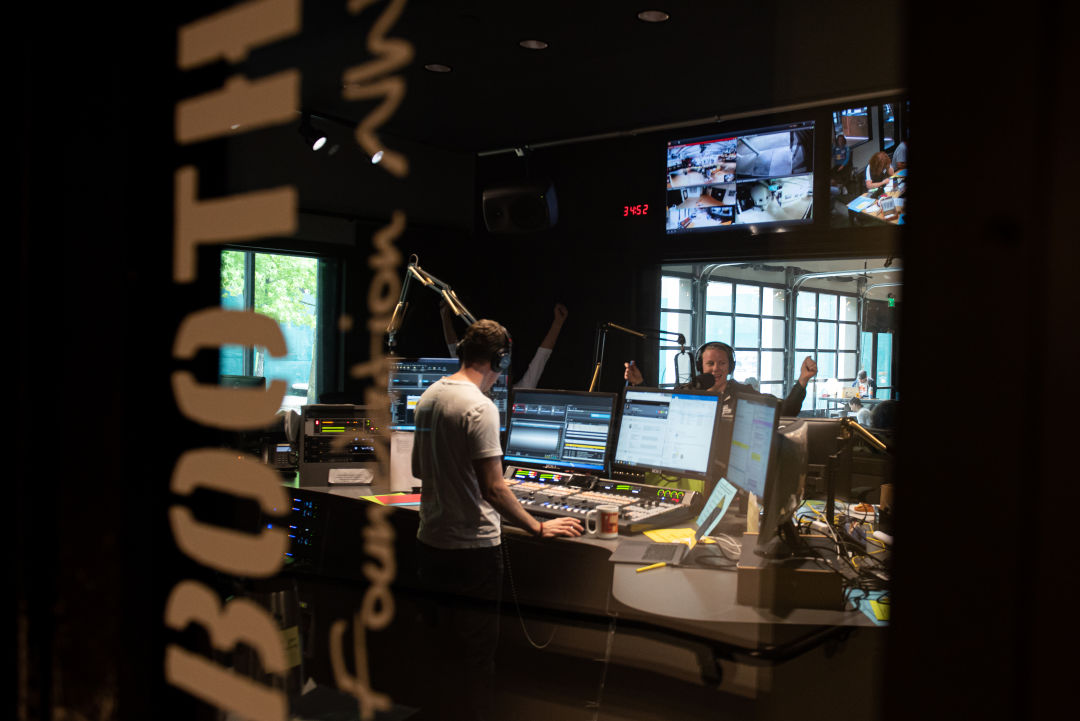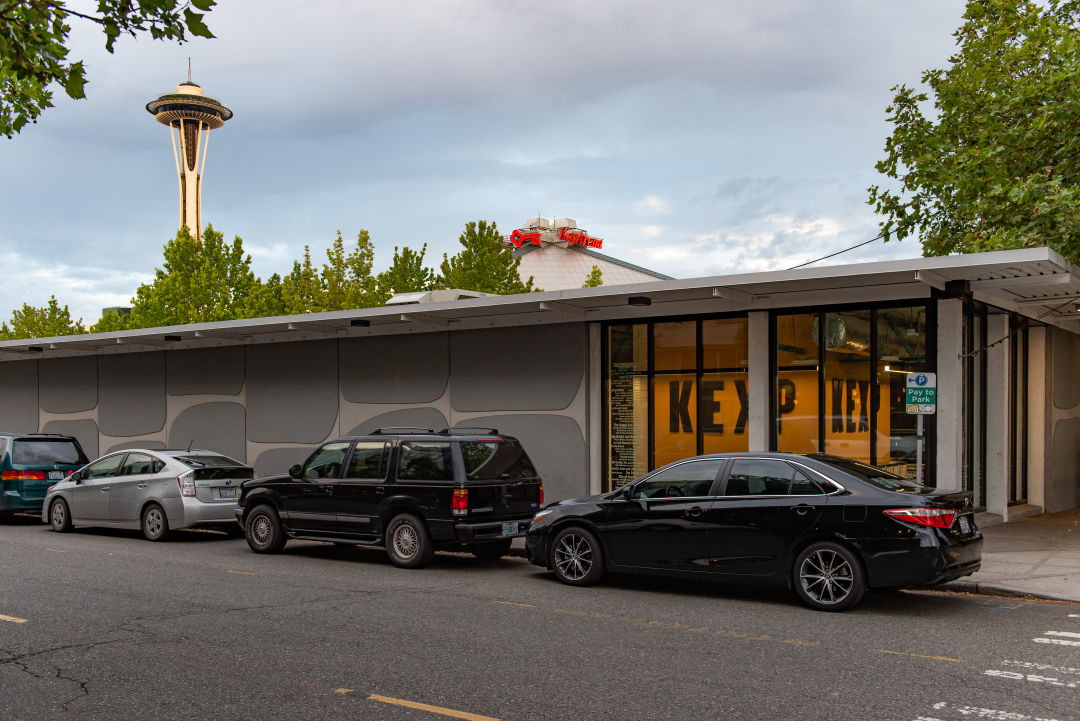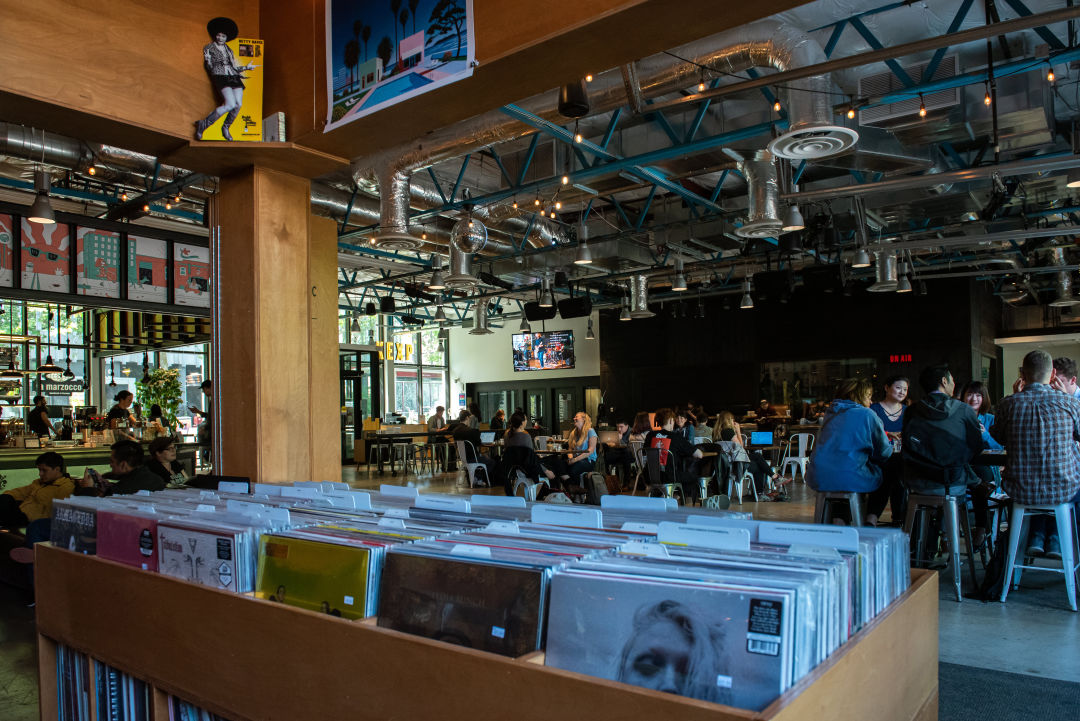KEXP Goes Live in the Bay Area

Brushing up against the 6pm final call at the Caffe Vita located in KEXP’s Gathering Space, half a dozen members of a local book club file out into the summer heat. On the other side of the glass, DJ Mike Ramos enters the booth, setting up to fill in for the 7pm show.
Much has changed since Ramos joined Seattle’s iconic independent music radio station in 2012. (For instance, the Gathering Space itself didn’t open until 2016.) But KEXP’s programming principles of championing local artists and multiple genres have stayed the same. Most recently, KEXP acquired a new FM signal in the Bay Area, and as of March 19, has been filling the airways of 92.7 San Francisco/Alameda.
“I’m hugely into it,” Ramos, who considers Oakland his second home, says. “The Bay Area has been a part of my upbringing … and there’s so much great stuff coming out of there.”
But the $3.75 million expansion sparked fear in some Seattle listeners. Ramos gets it, likening them to day-one indie band fans who dread change or, in this case, fear seeing their hometown station morph into something larger, less local, and less Seattle. “People do that with bands and radio stations, too, I guess,” Ramos says with a laugh.
When CEO Ethan Raup made the announcement in November 2023, he assured listeners that KEXP—“a Seattle-based radio station and arts organization that reaches millions of people all around the world”—would not change.
“We've gotten really comfortable broadcasting to the entire world from Seattle,” Raup says, “and we're never going to lose our Seattle roots.”
Those roots date back to 1972 when KEXP (first called KCMU) began broadcasting a 10-watt signal on 90.5 FM from the University of Washington’s Communications Building. Over the last five decades, KEXP built its success by giving DJs free rein, hosting live performances, and introducing and celebrating local artists. Along the way, the station has set the gold standard for independent radio.
“Staying true to who we are, that's a bedrock for us,” Raup says. “The other is a degree of ambition to take what we're doing and reach more people and engage more deeply with people and make the world a better place.”

Raup sees the new venture as part of that second bedrock. He says the Bay Area—which shares parallels with Seattle in its tech economy and thriving local music scene—provides a new space to test KEXP’s existing model.
“That's another part of the reason we had the confidence to try it out,” Raup says. “It's something we're very familiar with based on our experience in Seattle, where we have married what is a modest broadcast signal with pretty strong digital products.”
Concerns about dramatic changes at home subsided as 92.7 has thus far functioned as a simulcast of KEXP’s Seattle-based programming. Since March, many Bay Area listeners have warmed to KEXP, much like global listeners tuning into the Seattle-based online stream have for years.
Dave Hughes—Bay Area radio show host, music columnist, and longtime KEXP fan—sees no downside to KEXP’s Bay Area venture, “I'm at KVHS 90.5 FM out of Concord in the East Bay, and all of us volunteers over at that community radio station are thrilled with KEXP coming to the Bay Area,” Hughes says.
Others, like Lisbeth Ortega (known as DJ Lizzy al Toque), a host at Psyched! Radio in San Francisco, believe KEXP will have to up its investment in the Bay Area if it wants to replicate the kind of supportive, energetic arts community it has fostered in Seattle.
She feels the buzz that followed the project’s launch in March waned relatively fast, as did the focus on local musicians. As she put it, the programming “just went straight to KEXP stuff.” But KEXP is set to roll out its first weekly 92.7 Bay Area-focused show, Vinelands, August 17.
With the goal of being “San Francisco’s new station for music discovery,” Chief Programming Officer Chris Kellogg says Vinelands will be "a broad, cross-genre exploration of music of the Bay Area and Northern California from distinct points of view.” It’s a model that closely mirrors that of KEXP’s Audioasis (and will run at the same time for 92.7 listeners, from 6 to 9pm on Saturday nights).

The show will certainly help, says Ortega, but not entirely. For now, she says, KEXP doesn’t feel “tangible” in the Bay Area. It’s lacking spaces like Caffe Vita and events like live recordings, which were Ortega’s first introduction to KEXP years ago.
“I loved that they had this community space,” Ortega says, remembering a trip to Seattle. “I've never seen that before anywhere, not even in a place like New York or something. It felt like they cared about their audience and wanted the audience to be a part of it.”
Fans love KEXP’s old-school, hands-on, and deliberately human nature—a rarity in a digitized and hyper-corporate era where nationalized playlists and algorithms dominate the music industry.
But beyond the sets, much of KEXP's success has to do with the organization’s accessibility. Fans call and email the DJs, but they also brush shoulders with them at events and wave to them at work in the studio. And in the case of morning show DJ John Richards, they dine and drink at his bar in Capitol Hill.
Glimpses of an increased physical presence in the Bay Area are popping up. Richards recently spent a week down in the Bay Area and will return in October for a week-long tour of Bay Area records stores alongside KEXP DJs Cheryl Waters and Larry Mizell, Jr. The trio will broadcast from a new location each day.
Raup says they’ll continue to take development in the Bay slow—not just because of financial constraints, but because they want to do it right, learn the local community, and respond to its requests. How that might impact KEXP more broadly isn’t fully clear at the moment. But Raup says he’s open to anything.
“Where it goes over time, I don't know,” he says.




